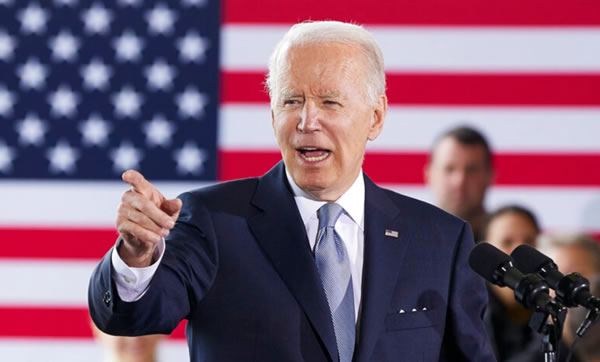
U.S. President Joe Biden will head to Israel Wednesday, as a humanitarian crisis grows in the Gaza Strip ahead of an expected ground invasion by Israeli forces.
National Security Council spokesman John Kirby told reporters that Biden will visit Tel Aviv before going to Jordan where he will meet with King Abdullah, Egyptian President Abdel Fattah el-Sissi and Palestinian Authority President Mahmoud Abbas.
The White House said Biden will reiterate that the militant group Hamas does not stand for the Palestinian people’s right to dignity and self-determination, and discuss the humanitarian needs of civilians in Gaza.
“(The) president will hear from Israel how it will conduct its operations in a way that minimizes civilian casualties and enables humanitarian assistance to flow to civilians in Gaza in a way that does not benefit Hamas,” U.S. Secretary of State Antony Blinken said after meeting with Israeli Prime Minister Benjamin Netanyahu.
Blinken also said his talks with Netanyahu yielded a possible breakthrough in getting humanitarian assistance to besieged Palestinians in the Gaza Strip.
“Today, and at our request, the United States and Israel have agreed to develop a plan that will enable humanitarian aid from donor nations and multilateral organizations to reach civilians in Gaza – and them alone — including the possibility of creating areas to help keep civilians out of harm’s way,” Blinken said in a brief statement to reporters.
He said it is critical that aid begin flowing into Gaza as soon as possible, but expressed concern that Hamas militants may try to seize supplies or prevent their distribution.
Grave humanitarian crisis
Palestinians in Gaza have been without electricity and under a complete Israeli siege with no food, fuel or water allowed into the Hamas-controlled territory since Oct. 9. Israel says it imposed the blockade in response to the deadly terrorist attack Hamas launched on Israeli towns on Oct. 7, which killed more than 1,400 Israelis. Nearly 200 others were taken hostage by the terror group.
Israel has amassed 300,000 troops on Gaza’s border, poised for a likely ground invasion, as it vows to wipe out Hamas.
Israeli forces have been hitting Gaza with airstrikes since the Hamas attack, killing more than 2,800 people and wounding at least another 10,000, according to the Gaza Health Ministry.
Hundreds of thousands of Gazans have heeded Israel’s orders to evacuate northern Gaza for the southern half of the Strip ahead of the expected offensive.
“There continues to be no water for the vast majority of the population in Gaza,” said Juliette Touma, spokesperson for the U.N. agency that assists Palestinians, UNRWA.
“We’re talking about 2 million people in the Gaza Strip who do not have water, and water is running out, and water is life, and life is running out of Gaza,” Touma said.
UNRWA said Monday that there are not enough body bags for the dead in Gaza.
Touma said an estimated 1 million Palestinians have fled toward the south and nearly 400,000 of them are sheltering mostly in UNRWA schools. One group is being housed in an UNRWA warehouse, which Touma said is not equipped to be a shelter.
UNRWA has deployed an advance team to Egypt to prepare for the possible opening of a humanitarian corridor to bring aid supplies into Gaza.
The United Nations said humanitarian chief Martin Griffiths will head to Egypt on Tuesday for several days. He also plans to visit Israel.
At the United Nations, the Security Council voted late Monday on a Russian-drafted resolution seeking a humanitarian cease-fire and the release of all Israeli and foreign hostages.
The measure, which Russia did not negotiate with council members, failed to receive the necessary support. Only five of the 15 council members supported the measure, four voted against it and six abstained.
The United States was among those who did not support it. Ambassador Linda Thomas-Greenfield said civilians should not have to suffer for Hamas’ atrocities, but said the proposed text failed to condemn the terror group.
“By failing to condemn Hamas, Russia is giving cover to a terrorist group that brutalizes innocent civilians,” she said. “It is outrageous, it is hypocritical, and it is indefensible.”
Northern front
There are fears that the fighting could expand to Israel’s border with Lebanon, where the Iranian-supported militant group Hezbollah said its fighters targeted five Israeli posts along Lebanon’s southern border.
The Israeli Air Force said Tuesday it struck Hezbollah “terror targets and military infrastructure” in Lebanon in response to militant fire toward Israel.
Speaking to the Israeli Knesset Monday, Israeli Prime Minister Netanyahu warned Iran and Hezbollah, “Don’t test us in the north. Don’t make the mistake of the past. Today, the price you will pay will be far heavier,” he said, referring to Israel’s 2006 war with Hezbollah.
The United Nations has a peacekeeping mission in southern Lebanon that monitors the border with Israel. It said Monday that its headquarters in the Lebanese town of Naqoura was hit, but no one was injured. A spokesperson said the U.N. is investigating to see who fired at the facility.
Margaret Besheer at the United Nations contributed to this article. Some information for this article came from The Associated Press, Agence France-Presse and Reuters.
Source: voanews.com























